Meat
A new strategic plan for the Welsh red meat industry has been created with the ultimate aim to increase sales by at least 34% to £776 million a year by 2020, Hybu Cig Cymru – Meat Promotion Wales (HCC) has reported.
The 2020 plan also stated the industry should increase its share of Welsh agricultural output by at least 5% to £624m over the same period.
HCC said these increases would see the red meat industry help boost the entire Welsh food and farming industry by at least 14% in five years to £6.5bn.
The two main priorities of the strategic action plan are: to increase demand for Welsh red meat products, thereby increasing sales and returns; and to improve production efficiency, thereby increasing quality supply, while maintaining the environment and landscape of Wales.
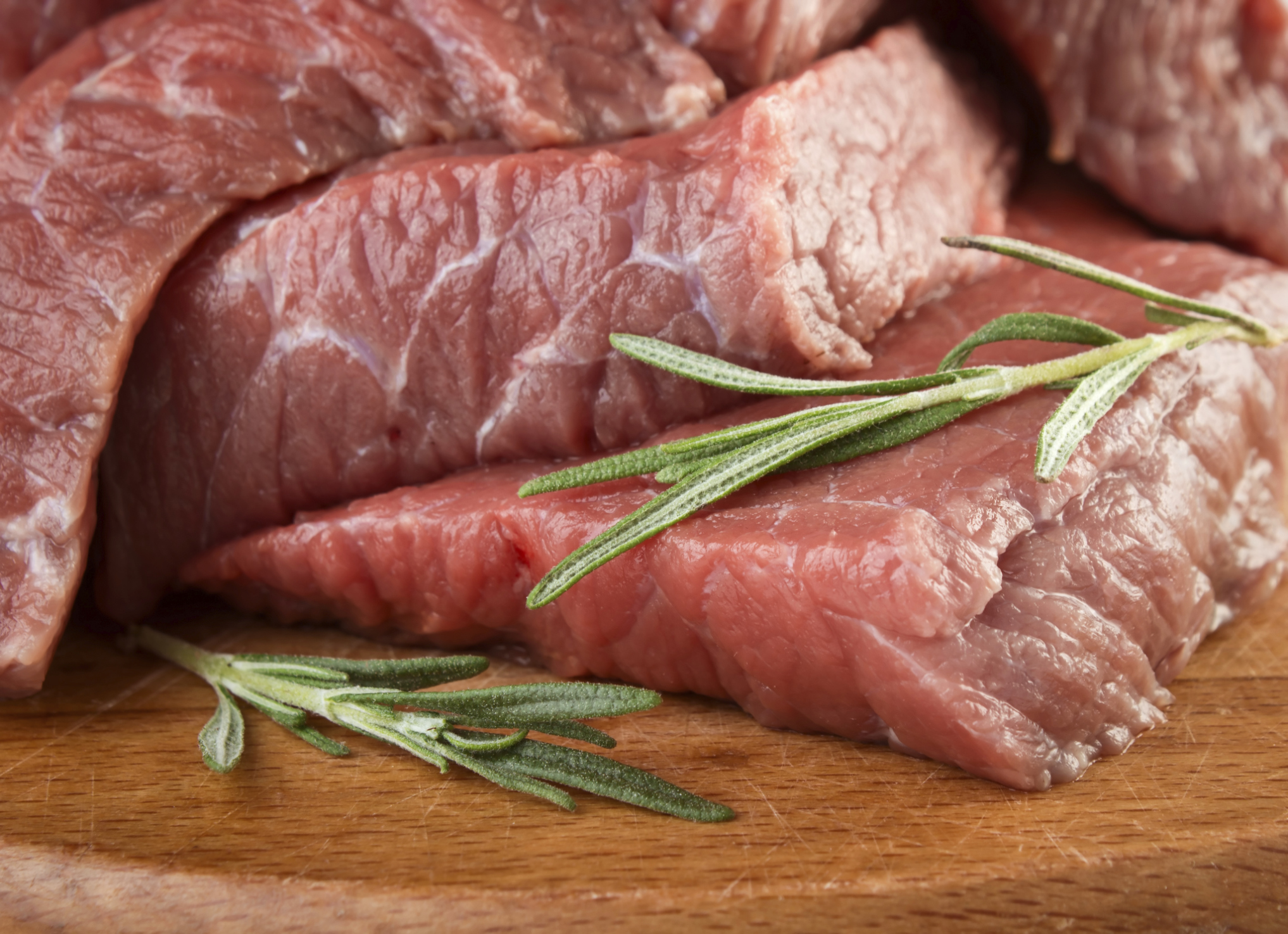
“It’s now time for everyone in the industry to have their say about the future direction of the Welsh red meat sector,” said HCC chief executive Gwyn Howells. “I would urge everyone who cares about its future to take part in the consultation process.
“In an increasingly competitive global marketplace, it is important that we continue to be dynamic in further developing our industry.
“If we are to safeguard the long-term future of the red meat industry and sustain the sector’s contribution towards a thriving rural economy, then we must embrace the latest production and processing methods to enable us to compete effectively with our rivals.
“This is an ambitious plan, but I am confident that if the entire industry continues to work closely together we can meet these bold targets.”
Meanwhile, Welsh red meat has increased its share of the British retail market by £64m over a 10-year period.
“These targets can only be met if the entire supply chain – including farmers, processors and retailers – work in harmony to build on our previous success to ensure a long-term and viable future for everyone,” Howells concluded.
HCC reported it would now enter into an eight-week consultancy process to implement the plan.
Lower material costs and currency exchange rates are impacting Hilton Food Group despite reporting a strong financial performance.
The company reported overall growth in Western Europe but continues to be “adversely affected” by lower material costs and currency exchange translation, causing turnover in Denmark to fall in comparison to last year. The UK operation has seen “encouraging” volume growth relative to last year and reported site development at the UK site will be completed, which will see capacity grow next year.
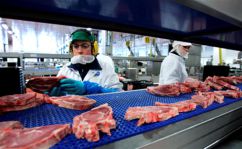
Hilton’s joint venture with Australian retailer Woolworths, which contributed to high revenues in 2013, is making “good progress”. The Victoria processing site is due to open in the first quarter of next year.
Business in Ireland has picked up following a “challenging” first half of the year. Meanwhile Hilton reported trading to be in line with expectations in Central Europe with continued growth in Poland.
“The Group’s financial position remains strong with net debt growing in line with expectations as the investment projects in UK and Sweden are being executed. Hilton continues to explore opportunities to grow the business in both domestic and overseas markets,” the company said in a statement.
Hilton is to announce its preliminary results for the 52 weeks ended 28 December 2014 on 25 March, 2015.
A young butcher has been declared the Yorkshire champion in the 2014 Young Butchers Creative Meat Display Competition.
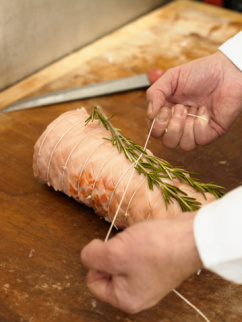
The event, which is was organised by butchery supplier Dalzeil, saw Joe Smith, from Lishman’s of Ilkley, steal the crown during a close fought competition in Glasshoughton, near Wakefield.
Joe, 21, said: “We were given two hours to work our magic on shoulders of lamb and pork, a knuckle of beef and a brace of chickens. We had to cut them up and make as many dishes as possible out of these products without having any waste.
“The judges were looking at our butchery and presentation skills and the imagination used to create the products. I produced 15 different dishes in total and was over the moon to be chosen as Yorkshire champion. Events like these are a great learning curve.”
Joe, who holds a NVQ Level 2 Meat & Poultry qualification and has completed his apprenticeship, has worked at Lishman’s for the past four years and has progressed quickly, with his efforts seeing him recently promoted to assistant shop manager.
Joe received a trophy, certificate, £100 worth of vouchers and butchery knives to the value of £200, presented by the British and Commonwealth featherweight boxing champion Josh Warrington, of Leeds.
Dalziel’s regional operations manager Mike O’Hara praised all the contestants. He said: “They demonstrated a high level of professionalism and excellent butchery skills. The overall displays were very impressive and inspirational.”
Pig prices have fallen to their lowest point since April 2013, as higher supplies and subdued demand have combined to produce a similar picture to that in the sheep meat and cattle sectors.
Bpex said that for the week ended 26 July, the UK-spec DAPP fell to 158.02p per kg, marking a decline for the fourth consecutive week.

AHDB Market Intelligence’s Stephen Howarth told meatinfo.co.uk that domestic production is high, with more pigs and higher carcase weights pushing up supply. He said the breeding herd had stabilised, with improved productivity due to mild weather.
Howarth added that there are more pigs coming in from abroad: “European pig prices are quite a bit lower than ours which has pulled some extra imports in.
”The increased supply has been met with subdued UK demand. Despite good barbecue weather, Howarth told meatinfo.co.uk that this has only slight offset the negative impact of this year’s mild climate, which is not conducive to the consumption of the higher value pork products – frying and roasting cuts.
He added: “I think people are still in a mind state that they have been in for the last few years and watching the pennies.
”However Howarth was also keen to stress that current prices are still historically quite high, and would have been at record levels 18 months ago. He said exports have been steadily rising over the last three years, despite the strengthening of the pound. Feed prices are also low, which helps with producers’ margins.

A young Devon farmer is preparing to embark on a 39-day tour of Europe to campaign for clearer poultry labelling – and is doing it dressed as a chicken.
Tamsin French will be costumed as a chicken called ‘Rosa’ and will travel through 21 EU member states in 39 days, which is apparently the average lifespan of an intensively farmed meat chicken. Rosa the chicken is calling for clear and mandatory labelling so that consumers can see how their chicken has been kept. The 39Days4Rosa tour is taking place as the European Commission reviews poultry meat labelling this summer.
French’s family farms a 22,000 strong, Freedom Food-assured broiler flock in Devon. She said: “Our free-range chickens live for 56 days, and from the moment they’re old enough to go outside, they can range through tree-covered, landscaped fields where they can express natural habitual behaviour. It’s important that consumers can accurately and easily identify the farm system used to rear their chicken meat. The labelling term ‘free range’ accurately reflects the life of our free-range chickens.”
She will be joined on the trip by Johanna Olsson, an Animal Science student from Berkshire, and Sam White, an animal welfare campaigner from Essex.
UK meat leaders have expressed disappointment over the reporting of a US-based study which claimed that beef production was 10 times more damaging to the environment than other livestock.
The study, published in the Proceedings of the National Academy of Sciences (PNAS), claimed that by applying a uniform methodology to data from the US Departments of Agriculture, the Interior and Energy, it showed that beef was far ahead of other proteins when it came to environmental impact.
A summary of the study said: “The authors found that impacts of dairy, poultry, pork, and eggs were mutually comparable within a factor of two. Beef, however, required 28 times more land, 11 times more irrigation water, five times more greenhouse gas emissions, and six times more reactive nitrogen fertiliser than the respective average burdens of the other four livestock categories.

”Plant-based production, however, including potato, wheat and rice, on average needed “two to six times fewer resources per calorie consumed than non-beef livestock”, it added.
The news has been widely reported across mainstream media, but UK meat bosses have hit back at the coverage, which they said failed to recognise that US production differed considerably from UK grass-fed production.
Nick Allen, sector director for red meat levy body Eblex, said: “Our rain-fed pasture system means we have one of the most efficient and sustainable livestock production systems in the world. In the UK, cattle and sheep primarily convert grass, which cannot be used to feed people, into nutritious food for our growing population. We have very little reliance on irrigation; in fact it takes just 67 litres of water to produce 1kg of beef.
“There are also additional environmental benefits of grazing ruminants, not least in terms of landscape management and maintaining biodiversity, yet livestock production still comes in for undue criticism.
”One of the authors of the report Professor Gidon Eshel, speaking to The Guardian newspaper, acknowledged that US grain-fed production systems exacerbated the issues surrounding feed inefficiency, but he said that even grass-fed cattle had greater environmental footprints than other animal products.
He said the aim of the study was to change the consumer mind-set: “While my work in recent years has clearly demonstrated that plant-based diets exact lower environmental costs than animal-based ones, in the new paper we recognise that this and related work by others have changed little in US diets; people still eat animal-based products with an ever-increasing gusto.
“Our study has a number of implications. First, it can help environmentally minded individuals make environmentally better dietary choices. Perhaps more importantly, the paper can also help inform US agricultural policy.”
In the wake of the UK’s beef pricing crisis, Waitrose has raised its “price floor” for British beef.
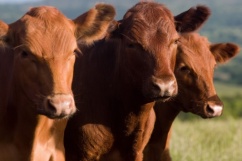
The supermarket set a minimum price it would pay British farmers for their beef at £3.40 per kilo until September 2014. However, this has now been raised to £3.45 per kilo until 1 October 2014. In addition to this price rise, Waitrose will also raise the price paid for standard British cattle, used for the Essential Waitrose range, by 0.02p per kilo. “Because British beef is such a key part of our business and we are certain that a further erosion of prices will not serve well processors or producers, we decided, in early May, along with our own dedicated processor Dovecote Park, to set a price floor for beef,” a spokeswoman for the supermarket told Meatinfo.
Meatinfo has reported extensively on the beef pricing crisis affecting British farmers, who have seen the farmgate price for beef cattle drop significantly. Farmers argue this has been caused by cheaper imports flooding the market, especially from Ireland, coupled by a lack of commitment from supermarkets to support British farmers.
This step from Waitrose has been welcomed by the National Farmers’ Union (NFU), which is urging other supermarkets to follow suit. Pete Garbutt, chief livestock advisor at the NFU, told Meatinfo: “This is good news and an example of a supermarket standing by its suppliers and looking to the long term.
“When Waitrose announced its threshold price last month the NFU came out and praised it publicly. This is a great example of supermarkets working for the long term and would love other supermarkets to take a similar view.”
A leading halal food producer is celebrating after landing a series of deals to give it a strong foothold across a number of European markets.

Lancashire-based KQF, which produces the Khan Exotique range of Halal certified burgers, kebabs and sausages, has signed a deal with Le Clerc, a major hypermarket chain across France, and other European countries. The deal builds on agreements with store chain Alphaprim and distFRESH, an independent halal distributor, both of which serve the Paris area.Faruk Vali, managing director of KQF, said: “Le Clerc is a key player in the market. It’s also an excellent strategic partner because it has a high profile and it’s expanding quickly. The listing of our products with such a significant retailer gives us an excellent means of introducing our halal-certified convenience foods to an entirely new group of European customers.
“Our research suggests that the European market for halal foods is buoyant. It’s currently worth around $30 billion and the figure is rising by approximately 15% a year. France has the largest Muslim population in Europe – a little under 5 million – so we developed a new product range, Khan Exotique, as our way of reaching out to that market. European consumers seem to be responding very well.”
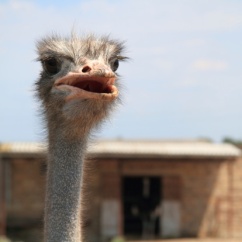
Ostrich meat is starting to appear on UK supermarket shelves, with Tesco trialling ostrich kebabs, and Lidl and Aldi due to stock the speciality meat later in the year.
Meat Trades Journal’s sister publication The Grocer revealed that Tesco is trialling free-range South African ostrich kebabs in 400 stores and offering 300g packs of four Mossel Bay ostrich kebabs for £5. It also reported that Aldi will be selling ostrich kebabs in September, with Lidl planning to roll out the exotic meat at Christmas.
Tesco’s kebabs are supplied by db foods, a Dorset wholesaler, which supplies a varied selection of meat products, including a diverse game selection. The wholesaler already supplies a large number of butchers with ostrich and the kebabs are available in Whole Food Markets.